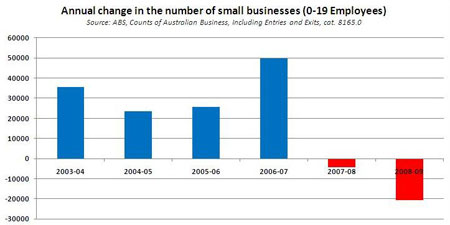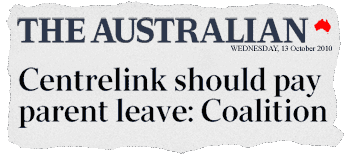Small business has been doing it tough since Labor was elected in 2007. The number of small businesses in Australia dropped by over 24,000 from June 2007 to June 2009. See for yourself:
Labor are making this worse by burdening small business with being the pay clerk for its Paid Parental Leave scheme. Despite spending millions of dollars to set up its PPL scheme within Centrelink, Labor will disband this in July and force small business to do the paperwork.
The Coalition has a better plan. We have moved to ensure that the red tape burden, the cost of revising pay systems, receiving and reconciling Government payments and passing on payments are not dumped on small business people.
But Labor will also raise the cost of employing people. By increasing superannuation contributions from 9% to 12%, Labor will add billions to the payroll costs of small business.
Labor’s employer funded superannuation contribution will add somewhere between $20 billion and $23.6 billion per annum to payroll costs across the economy.
The Government will then take back over $3 billion in taxes, and then the states will skim off more money from small business in payroll tax.
Labor has made a lot of noise about its tax cuts for small business. Frankly, given the additional red tape burdens of the Paid Parental Scheme, the increased payroll commitments from the super increase, the tax cuts will struggle to cover the costs small businesses will have to pay to cover Labor’s election promises.
It is worth remembering that Kevin Rudd’s Resource Super Profits Tax and Julia Gillard’s Minerals Resources Rent Tax were going to fund the tax cuts for small business. Given the current constitutional limbo that the MRRT now faces, the small business tax cuts that Labor tied to it are now also in trouble.
Labor simply does not understand small business. And since it came to office, it has given every indication of not being interested as it increases the burden of red tape and the costs of doing business.
The Liberal Party will continue to fight for the interests of small business, including reducing the damage caused by Labor policies that increase red tape and the time small businesspeople spend on paperwork – rather than in their businesses or with their families.



